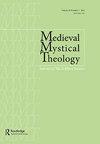Divine Nothingness, Ecstasy and Self-transcendence in the Evangelical Pearl
IF 0.3
0 RELIGION
引用次数: 1
Abstract
ABSTRACT This article considers a key topic from medieval theological anthropology by examining how ecstasy and self-transcendence relate to divine nothingness. It discusses this topic by examining a spiritual classic written by a female author and published in 1538 but largely forgotten, namely, The Evangelical Pearl, which encapsulates central themes from Jan van Ruusbroec and Meister Eckhart and passes them on to the modern age. This contribution argues that divine nothingness elicits a theological-anthropological response of ecstasy and self-transcendence, which is best understood as a disposition of radical recollection, dispossessiveness and gratuitousness of one’s memory, intellect and will. The final part of this paper considers the question whether our author’s negative theology of nothingness is vulnerable to Luther’s criticism of apophaticism and its alleged lack of Christocentric grounding.《福音之珠》中的神性虚无、狂喜与自我超越
摘要本文探讨了中世纪神学人类学中的一个关键话题,即狂喜和自我超越是如何与神圣的虚无联系在一起的。它通过研究一位女性作家写的一部精神经典来讨论这个话题,该经典出版于1538年,但基本上被遗忘了,即《福音珍珠》,该书概括了扬·范·鲁斯布罗克和梅斯特·埃克哈特的中心主题,并将其传给了现代。这一贡献认为,神圣的虚无引发了狂喜和自我超越的神学人类学反应,这最好被理解为对一个人的记忆、智力和意志的激进回忆、剥夺和无偿的倾向。本文的最后一部分考虑了一个问题,即我们作者的否定的虚无神学是否容易受到路德对暴民主义的批评及其所谓的缺乏以基督为中心的基础。
本文章由计算机程序翻译,如有差异,请以英文原文为准。
求助全文
约1分钟内获得全文
求助全文

 求助内容:
求助内容: 应助结果提醒方式:
应助结果提醒方式:


